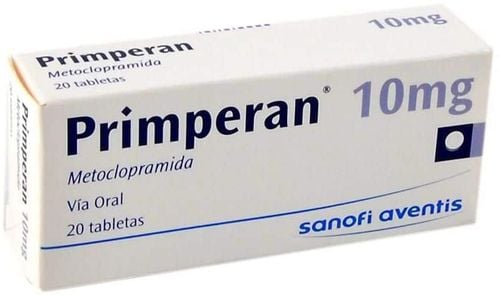This is an automatically translated article.
Primperan (metoclopramide) is used to treat gastrointestinal motility disorders, nausea and vomiting? What precautions should be taken when using Primperan? Read the article below to better understand Primperan.
1. What does primperan do?
Indications:
Symptomatic treatment of nausea and vomiting caused by acute migraine. Late (but not acute) nausea and vomiting due to chemotherapy, radiation therapy. Prevention of postoperative nausea and vomiting. Children 1-18 years of age: Drug of second choice for the prevention of delayed chemotherapy-induced nausea and vomiting and for the treatment of postoperative nausea and vomiting Contraindications:
Hypersensitivity to the drug or to any any component of the drug or have been previously intolerant to the drug. Mechanical obstruction, gastrointestinal perforation or antiemetic after gastrointestinal surgery only 3-4 days because the drug causes increased gastrointestinal motility. Gastrointestinal bleeding. The patient has had epilepsy. People with pheochromocytoma, because the drug can cause high blood pressure in people with this condition. Have ever had methemoglobinemia. Pheochromocytoma or suspected pheochromocytoma due to risk of hypertensive crisis. Have metoclopramide-induced dyskinesia or previous sedative-induced dyskinesia. Contraindicated in children < 1 year old.
2. How to use and dose Primperan
How to use:
Use 30 minutes before meals and at bedtime.
Dosage:
Nausea and vomiting; Prophylaxis of nausea and vomiting associated with chemotherapy or radiotherapy 10 mg until treatment. Maximum: 30 mg or 0.5 mg/kg/day, up to 5 days.
GERD 10-15mg up to 4 times/day depending on severity of symptoms. Maximum: 60 mg/day, up to 12 weeks.
Diabetic gastric stasis
For early manifestations: 10 mg up to 4 times/day for 2-8 weeks. Maximum: 40 mg/day. Prioritize radiological examination of the upper gastrointestinal tract; Small bowel intubation 10-20 mg as a single dose.
3. Side effects when using Primperan
Diarrhea, nausea. Unusual fatigue and muscle weakness. Causes somnolence, acute dystonia especially in young female patients, restlessness, Extrapyramidal disorders, Parkinson's syndrome and restlessness, depression. Constipation, nausea, unusual dry mouth. Amenorrhea, hyperprolactinemia. Dystonicity, movement disorders, reduced cognitive ability. Illusion. Bradycardia (especially with intravenous preparations). Feeling of breast swelling, increased sensitivity.
4. Possible drug interactions when taking at the same time as Primperan
Levodopa. Alcohol. Anticholinergics and morphine derivatives. Barbiturates, clonidine and related drugs. Sedatives: May potentiate the effects of neuroleptics and cause extrapyramidal disturbances. Serotonergic drugs: May increase the risk of serotonin syndrome. Digoxin. Cyclosporin. mivacurium and suxamethonium. Fluoxetine and paroxetine.
5. Notes when using Primperan
Careful instructions should be given to the patient before use. Warning that the drug may affect driving or operating machinery. Extrapyramidal reactions may occur during treatment with metoclopramide, particularly in children and adults <30 years of age, or at high doses (prophylaxis of nausea and vomiting associated with chemotherapy in cancer treatment). The risk of neurological effects such as extrapyramidal effects and tardive dyskinesia outweighs the benefits of long-term or high-dose treatment. Use only short-term metoclopramide (up to 5 days). The use of metoclopramide is not recommended in chronic diseases such as decreased gastric contractility, dyspepsia and gastroesophageal reflux disease and as an adjunct in surgical procedures. Discontinue metoclorpamide in patients with symptoms of tardive dyskinesia. Use caution or preferably do not use metoclopramide in people with Parkinson's syndrome. If neuroleptic malignant syndrome is present, metoclopramide should be discontinued immediately. This drug is also not for use in people with a history of depression. Metoclopramide should be used with caution for the prevention of postoperative nausea and vomiting, as it may stimulate gastrointestinal motility, increase suture pressure or intestinal closure. Patients with liver or kidney damage or heart failure are at risk of fluid retention or hypokalemia, so they should be monitored during treatment. If there are symptoms of fluid retention, the drug must be stopped immediately. Note to pregnant and breast-feeding women:
Pregnant women
Metoclopramide crosses the placenta and metoclopramide is probably safe for pregnant women. However, when the drug is used in late pregnancy, extrapyramidal symptoms may appear in the neonate. Therefore, it is necessary to carefully monitor the baby after birth if the drug is used in the last 3 months of pregnancy. Breastfeeding women
Metoclopramide is excreted in breast milk, so breastfed babies may experience unwanted effects due to the drug. Therefore, the use of metoclopramide during lactation is not recommended. In lactating women taking metoclopramide, discontinuation should be considered.
6. Treatment of overdose
Symptoms: Extrapyramidal disorders, somnolence, confusion, somnolence (severe), cardiac arrest, respiratory arrest. These symptoms can also be seen at normal doses but are rare, especially in children and young adults when high doses are used to treat nausea and vomiting caused by anticancer drugs.
Treatment : There is no specific antidote. Symptomatic and supportive treatment.
If extrapyramidal disorders occur, use symptomatic therapy including benzodiazepines in children and/or anticholinergics for Parkinson's disease in adults.
If poisoning is acute and not anaesthetic, gastric lavage can be performed. If comatose, intubate with balloon inserted before gastric lavage.
7. How to store Primperan
Store at a temperature of 15 - 30 degrees C Keep the medicine in a cool, dry place. Keep out of reach of children, small children and pets in the house. Do not use expired medicine. Primperan is a brand name drug containing the active ingredient metoclopramide used in the treatment of vomiting of various etiologies. While taking the drug, patients may experience side effects that even affect daily activities: weakness, muscle weakness, etc. Therefore, patients need to monitor the symptoms caused by the drug. If the condition becomes serious, call your doctor immediately for prompt treatment.
Please dial HOTLINE for more information or register for an appointment HERE. Download MyVinmec app to make appointments faster and to manage your bookings easily.













